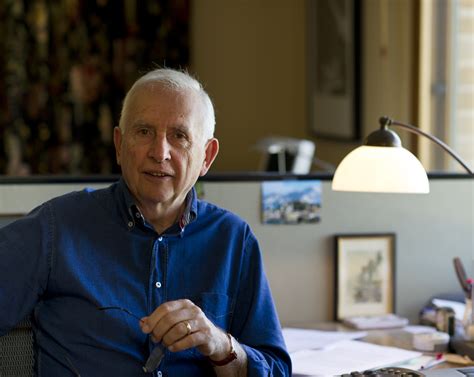A Quote by Maya Angelou
We write for the same reason that we walk, talk, climb mountains or swim the oceans — because we can. We have some impulse within us that makes us want to explain ourselves to other human beings. That’s why we paint, that’s why we dare to love someone- because we have the impulse to explain who we are. Not just how tall we are, or thin… but who we are internally… perhaps even spiritually. There’s something, which impels us to show our inner-souls. The more courageous we are, the more we succeed in explaining what we know.
Quote Topics
Because
Beings
Climb
Courageous
Dare
Even
Explain
Explaining
How
Human
Human Being
Human Beings
Impulse
Inner
Just
Know
Love
Love Someone
Makes
More
Mountains
Oceans
Other
Our
Ourselves
Paint
Perhaps
Reason
Same
Show
Some
Someone
Something
Souls
Spiritually
Succeed
Swim
Talk
Tall
Thin
To Love
Us
Walk
Want
Which
Why
Within
Write
Related Quotes
We write for the same reason that we walk, talk, climb mountains or swim the oceans - because we can. We have some impulse within us that makes us want to explain ourselves to other human beings. That's why we paint, that's why we dare to love someone - because we have the impulse to explain who we are.
The reason why we want to remember an image varies: because we simply 'love it,' or dislike it so intensely that it becomes compulsive, or because it has made us realize something about ourselves, or has brought about some slight change in us. Perhaps the reader can recall some image, after the seeing of which he has never been quite the same.
Perhaps because the origins of a certain kind of love lie in an impulse to escape ourselves and out weaknesses by an alliance with the beautiful and noble. But if the loved ones love us back, we are forced to return to ourselves, and are hence reminded of the things that had driven us into love in the first place. Perhaps it was not love we wanted after all, perhaps it was simply someone in whom to believe, but how can we continue to believe the the beloved now that they believe in us?
I think that comes with a collaboration with the writers. I think that we get cast in edgier roles because we are a little more offbeat, so people - as we get to know the writers, and as the writers get to know us, they start to write around us more, and that's why I think the pilot is not always the best way to get to experience a new television show, because we're fitting ourselves into these characters. Whereas as the show evolves, they're writing the characters for us and for our strengths and weaknesses.
Artists use frauds to make human beings seem more wonderful than they really are. Dancers show us human beings who move much more gracefully than human beings really move. Films and books and plays show us people talking much more entertainingly than people really talk, make paltry human enterprises seem important. Singers and musicians show us human beings making sounds far more lovely than human beings really make. Architects give us temples in which something marvelous is obviously going on. Actually, practically nothing is going on.
We see ourselves in other people’s eyes. It’s the nature of the human race; we are a species of reflection, hungry for it in every facet of our existence. Maybe that’s why vampires seem so monstrous to us—they cast no reflection. Parents, if they’re good ones, reflect the wonder of our existence and the success we can become. Friends, well chosen, show us pretty pictures of ourselves, and encourage us to grow into them. The Beast shows us the very worst in ourselves and makes us know it’s true .
The primary function of poetry, as of all the arts, is to make us more aware of ourselves and the world around us. I do not know if such increased awareness makes us more moral or more efficient. I hope not. I think it makes us more human, and I am quite certain it makes us more difficult to deceive.
This is not just a simple story of "money can't buy happiness." Or maybe that's just what it is. And if it is, why shouldn't it be? Because if this is something we are already supposed to know, then why don't we know it? Why do we chase and scrabble and fight for things to flaunt, why? Why do we reach for power over other people, and through the thin superiority of our possessions, believe we have it? Why do we let money make people bigger, and allow those without it to be made smaller? How did we lose the truth in the frantic, tribal drumbeat of more, more, more?
One of the most important responsibilities of leaders in any setting - including business organisations - is to tell us our own story; to explain us to ourselves; to help us weave some meaning and purpose into the fabric of our lives; to illuminate our understanding of where we have come from; to paint word pictures of our future onto which we can project our aspirations.
In our childhoods we either get all the social and emotional and ethical skills we need to be well adjusted adults, or we don't. Some of us don't know how to tell someone we like them. A lot of us get depressed and get wasted. Why don't we do something that makes us feel better? Because we don't know any other way. When I didn't have enough skills I compensated with drugs and alcohol. It's like there was a hole in the wall and I put a poster over it.
We come here because we too feel a responsibility for the human community. To preserve and develop a human quality of life is the common responsibility of us all. It is not fitting that those concerned with the various aspects of the human be alienated from each other. Both you and ourselves represent forces too profound and aim at objectives too significant for either of us to succeed completely without the assistance of the other. The urgency of our work impels us to get on with our common task lest a new period of disaster erupt over the Earth.
As for the flood carving Grand Canyon, why don't they explain to us why the top of the Canyon is 4,000ft higher than where the river (Colorado River) enters the canyon? Why don't they explain to us how rivers miraculously flowed up-hill for millions of years to finally cut the groove deep enough so they could flow downhill?




































